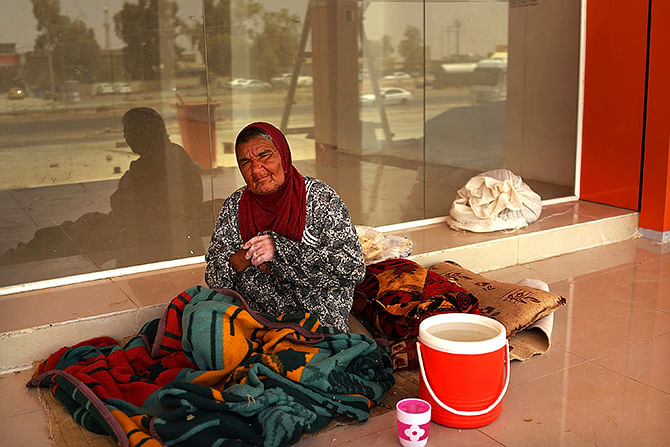Fighting in Tikrit after 'caliphate' declared
Fighting in Tikrit after 'caliphate' declared

There are reported to have been fresh clashes between jihadist-led Sunni rebels and government forces around the Iraqi city of Tikrit.
Witnesses said there had been a wave of air strikes and that former President Saddam Hussein's palace had been hit.
A local source told the BBC the rebels had meanwhile seized parts of a nearby military base in a counter-attack.
It comes a day after the Islamic State in Iraq and the Levant (Isis) announced the creation of a "caliphate".
The rebels reportedly seized control of parts of the Speicher army base to the north of the city, despite coming under attack from government helicopters.
The Iraqi army denied reports that the rebels had driven back a convoy coming to the aid of the base.
Tikrit was seized by Isis-led militants on 11 June as they swept across large parts of northern and western Iraq, and has been the scene of fierce clashes between the two sides in recent days.
On Friday, soldiers recaptured part of the campus of Tikrit University.
The fighting comes a day after Isis said it was establishing a caliphate, or Islamic state, on the territories it controls in Iraq and Syria.
It also proclaimed the group's leader, Abu Bakr al-Baghdadi, as caliph and "leader for Muslims everywhere".
Setting up a state governed under strict Islamic law has long been a goal of many jihadists.
Isis also said that from now on it would be known simply as "the Islamic State". Abu Bakr al-Baghdadi, the group said, would be referred to as "Caliph Ibrahim".
ANALYSIS: THE BBC'S PAUL ADAMS IN BAGHDAD
It's easy to dismiss the latest crop of Isis videos and statements as mere propaganda (however well produced), but the announcement of the establishment of a caliphate is rich with religious, cultural and historic significance.
Generations of Sunni radicals have dreamt of a moment when, in the words of Isis spokesman Abu Muhammad al-Adnani, Muslims "shake off the dust of humiliation and disgrace" and a new caliphate rises out of the chaos, confusion and despair of the modern Middle East.
Many Sunnis, and all Shia, will recoil in horror from the barbarism that has accompanied this moment, but the sight of old colonial-era boundaries being erased is a powerful statement, designed to attract new recruits to this whirlwind jihad.
In one of the Isis videos uploaded on Sunday, a bearded fighter called Abu Safiyya guides the viewer around a newly demolished border post. The video, with its arresting imagery and impressive production values, is designed to electrify the group's followers.
The fact that Abu Safiyya is described as being from Chile merely adds to what the authors hope is now the organisation's global appeal
Meanwhile, Israeli Prime Minister Benjamin Netanyahu called for the creation of an independent Kurdish state in response to gains made by Sunni insurgents in Iraq.
In a speech in Tel Aviv on Sunday, he said the Kurds were "a nation of fighters and have proved political commitment and are worthy of independence".
The Kurds have long striven for an independent state but they remain divided between Syria and Turkey, Iran and Iraq.
The international community, including neighbouring Turkey and the US, remains opposed to the break-up of Iraq.